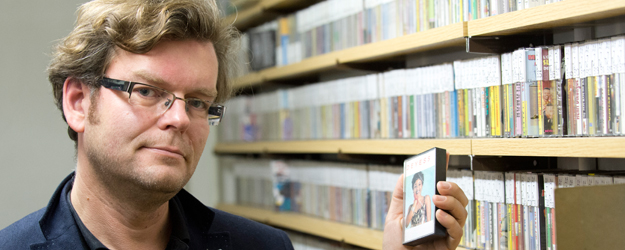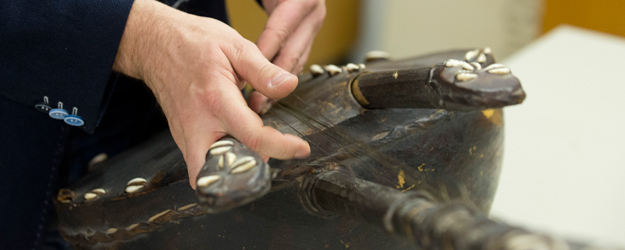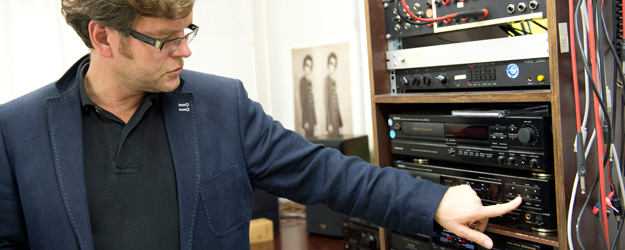7 November 2012
There are more than 10,000 recordings stored in the Department of Anthropology and African Studies at Johannes Gutenberg University Mainz (JGU). The African Music Archives (AMA) represents a unique treasure trove of African music. There are old shellac disks from Tanzania, LPs from Mali, and the latest CDs from Senegal. Archive Director Dr. Hauke Dorsch invites visitors on a tour of this diverse aural landscape.
Down here the ceilings are low, the pipes are thick as a leg, steel doors guard small rooms, the air tastes dusty. The basement floor below the seminar rooms and offices of the Department of Anthropology and African Studies at JGU is home to music. Yandé Codou Sène's voice pounds powerfully out of a speaker, first solo, then joined by the somewhat deeper voice of Youssou N‘Dour. The sound of a cappella music fills the basement vault.
"Just to give you an impression of some of the things we've got here,“ Dr. Hauke Dorsch says as he fiddles with the controls. On the stereo is one of roughly 10,000 physical recordings held by the African Music Archives (AMA) at Mainz University. There is no other collection like it in Germany.
Song of praise for a president
"Yandé Codou Sène is a griot, a courtly praise singer from Senegal.“ Her song has a very long tradition and goes back to ancient Ghana of over 1,000 years ago – and the name Ghana here has nothing to do with the nation that bears that name today. "The Ghana of old was in the Sahara." Griots sang to entertain princes and merchants. Among the figures for whom Sène has sang her songs of praise is Léopold Sédar Senghor, the poet president and one of the key players in the shaping of modern independent Senegal.
The AMA is a doorway to a unknown world. A knowledgeable guide is a must. Dr. Hauke Dorsch, director of the collection since 2010, assumes that role. His realm includes modern African pop music of every stripe – an unbelievably broad spectrum. "There is no clear differentiation made in Africa between traditional music and popular music," the anthropologist explains. Sène is a good example of this. Although a griot, she is also a pop star in her home land.
The griots and the kora
In the corner stands a favorite instrument of the griots, a kora. "The experts argue whether it should be classified as a lute or a harp," Dorsch says with a smile. This isn't of particular interest to him, he has not got involved in the dispute. Cowhide is stretched over a calabash. The neck of the instrument with 21 strings is flanked by two short handles. The musician grasps these, then plucks the strings between index finger and thumb. "This kora here was produced for tourists. You can't play it." But it does give a feel for the real thing.
The AMA stretches out across several basement rooms. One of these contains a mountain of articles, such as those about the singer-songwriter Salif Keiita from Mali and others about Mbalax, a variant of popular music in Gambia and Senegal that mixes regional sounds with rhythm and blues or Latino beats. "We're still cataloging," Dorsch says, and points to a pile of newspapers.
The bequest of a major collector
He and his student assistants have so much to do as a result of a bequest by Professor Dr. Wolfgang Bender, who founded the AMA at JGU in 1991 and supervised it until he left Mainz University in 2008. Bender's passion was collecting itself; the tiresome job of cataloging onto file cards was less his strength.
The professor of anthropology brought 800 shellac records from Ghana, Tanzania, and Kenya to Mainz. The oldest of them were produced in the 1940s. Most are of Highlife music, a genre that accompanied the independence movement in Ghana some 50 years ago. Dorsch recently put on a sample of this music during a down period at an anthropology conference. "What in the world is that?" his colleagues asked. "That all really sounds Latin American."
When shellac goes moldy
“The Stargazers of Kumasi” doesn't really sound much like what a lay person would expect of African music. Dorsch plays a piece titled "Obra." It would be difficult to imagine something with a more Latin American sound. It provides a convincing counterargument to anyone who claims that African music can be easily characterized. In fact it's difficult to even find a lowest common denominator. "That starts with the fact that the drum doesn't play the same role everywhere you go," is the way Dorsch explains some of the differences. "And West Africa stands for rhythmic complexity, while in southern Africa that's not the case at all."
The anthropologist carefully lifts the shellac disk off the player. They are quite fragile – and apart from that they can even go moldy if not taken care of. Exactly that happened two years ago and there was a risk that the collection would be lost. Dorsch and helpful students cleaned each physical recording carefully with water and a splash of cleaner.
Research and teaching in the 'underworld'
There are roughly 800 shellac and 100 acetate records, 7,000 vinyl disks, 1,500 music cassettes, 1,000 CDs, 1,300 video tapes, and a mountain of newspaper articles, all ready for research. "There may exist only private collections that are of a comparable scope," says Dorsch. But they are not always accessible.
This has made the AMA a draw for researchers, including those from abroad. However, the basement is most frequently used by JGU students looking for material for their seminar papers. They can even make copies of the recordings. "They have to sign a document confirming that all materials are solely being used for academic purposes."
Dr. Hauke Dorsch himself teaches courses on numerous topics related to African music. With the help of his two student assistants, he can open the AMA three days a week. And he is seeking to enlarge the collection when possible. Until this year, he had an annual budget of about EUR 7,000. Now that money has fallen victim to budget cuts. That's clearly a tough pill for Dorsch to swallow. In the past he's managed to raise third-party funds for small concerts and exhibits, but it's an exhausting process.
Money is tight
There are plenty of areas ready for research in the archive. There are plenty of challenges, too. The cataloging process is still incomplete, and digitalization is on the agenda. The Internet offers new opportunities and new challenges as well. What will be the AMA’s policy when it comes to downloads on the Internet?
But for the present, all that can wait as Yandé Codou Sène's voice echoes through the basement, joined in by a harmonizing Youssou N‘Dour a few bars later. Even here, under leg-thick pipes and behind steel doors, the vivacity of Africa shines through.



